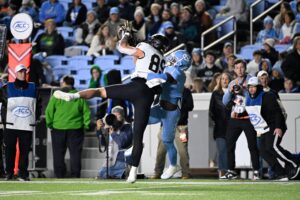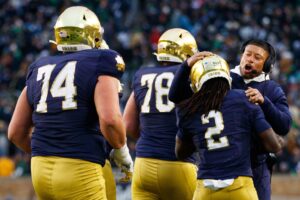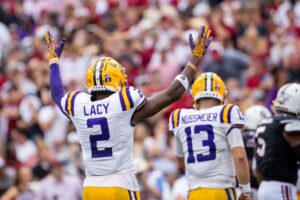In findings made public on Friday, the National Labor Relations Board made two groundbreaking rulings that could affect the future of major college football.
National Labor Relations Board Makes Presence Felt in College Football
The proceedings which produced the rulings were in regards to the football program at Northwestern University, a private school and long-time member of the Big 10.
In the rulings, the NLRB declared it “unlawful” for the university to bar its football players or any other athletes from using social media, censor the content of their self-expression, or give interviews to the media which haven’t been previously arranged by the school’s athletic department.
The other part of the ruling that could be revolutionary in further proceedings is that the NLRB treated Northwestern‘s football players as “statutory employees” of the university.
There are a few important things to remember when considering this situation.
First, the NLRB’s findings do not have the force of law behind them. In the midst of the proceedings, Northwestern voluntarily agreed to alter the language in its handbook for athletes which the NLRB found to be unlawful. The NLRB opted not to take jurisdiction over the university in this matter.
The fact that Northwestern is a private institution is even more paramount to understanding this situation. The rulings have no effect over and the NLRB has no jurisdiction in similar matters at public colleges/universities.
Outside of putting enough pressure on Northwestern to change its policies, there could be other consequences of these rulings.
Athletes at similar private institutions like the University of Notre Dame could file complaints with the NLRB. Athletes would do so with this new precedent on their side, and it bears watching whether the 16 other private schools which participate in football at the FBS level will modify their own policies in keeping with the NLRB’s findings.
More importantly, this opens up an entirely new arena in which the debate over whether athletes at private universities should be paid above and beyond their cost of attendance can be held. Prior to this ruling, those legal disputes have been relegated to antitrust courts.
As long as the NLRB views these athletes as “statutory employees” and not “students first and foremost” as Northwestern argued in the now-concluded proceedings, it’s more likely that the NLRB would rule in favor of such athletes who would bring such a challenge.
Making Northwestern and the other 16 private FBS institutions adopt such a radical change would require more than just pressure, however. That would probably demand the NLRB actually take jurisdiction over the situation, which is exactly what the NLRB has been reluctant to do because in 16 of these 17 cases, the school is part of a conference along with public institutions.
Could that make Notre Dame, which maintains its independence for football, the first place where the NLRB steps in and forces the school to pay its players? It isn’t out of the realm of possibility now. In order for that to happen, however, someone will have to file a claim with the NLRB alleging that not paying the players is an unfair labor practice.
An interesting anecdote is that there is a provision in labor law which allows anyone, anywhere at any time to bring a claim before the NLRB, regardless of their connection or lack thereof to the situation in dispute. The person who brings such a claim could not be a player at Notre Dame or have any connection to the university whatsoever.
If anyone does file such a claim, however, they would be best advised to have sufficient legal counsel, along with a stock of funds to compensate those attorneys and determination to see the proceedings through. The response from Notre Dame, and the 16 other FBS private schools, is likely to be immediate and strong.






